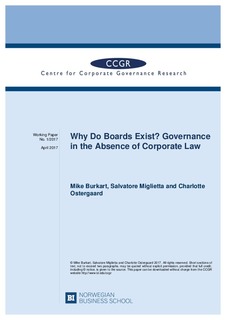| dc.contributor.author | Burkart, Mike | |
| dc.contributor.author | Miglietta, Salvatore | |
| dc.contributor.author | Østergaard, Charlotte | |
| dc.date.accessioned | 2018-03-06T11:55:36Z | |
| dc.date.available | 2018-03-06T11:55:36Z | |
| dc.date.issued | 2017 | |
| dc.identifier.uri | http://hdl.handle.net/11250/2488877 | |
| dc.description.abstract | We study how owners trade off the costs and benefits of establishing a board in a historical setting, where boards are optional and authority over corporate decisions can be freely allocated across the general meeting, the board, and management. We find that large owners and boards are substitutes and that boards exist in firms most prone to collective action problems. Boards monitor, advise, and mediate among shareholders, and these different roles entail different allocations of authority. Boards also arise to balance the need for small shareholder protection with the need to curb managerial discretion. | nb_NO |
| dc.language.iso | eng | nb_NO |
| dc.publisher | BI Norwegian Business School | nb_NO |
| dc.relation.ispartofseries | CCGR Working Paper;1/2017 | |
| dc.title | Why Do Boards Exist? Governance in the Absence of Corporate Law | nb_NO |
| dc.type | Working paper | nb_NO |
| dc.source.pagenumber | 64 | nb_NO |
